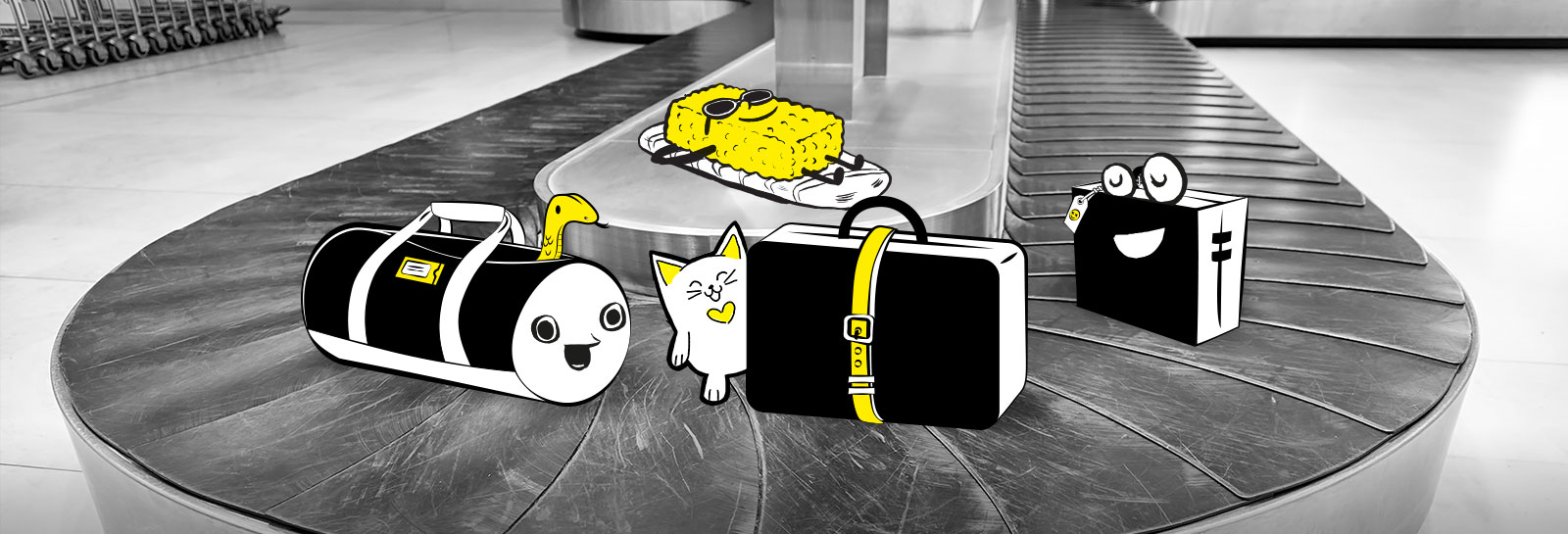Baggage allowances weighing on your mind?
Checked baggage1
In keeping with our philosophy of maximum choice, we’ve bundled several checked baggage options into our fare bundles for your convenience:
FlyBag / FlyBagEat
20kg allowance
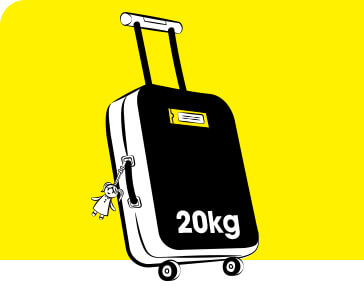
ScootPlus
30kg allowance
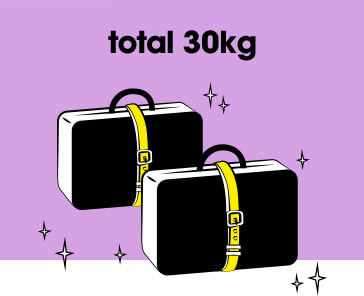
1For each checked baggage, the sum of the length, width and height should not exceed 158cm (62 inches).
You can also opt for our Fly fare which does not include any checked baggage allowance.
But if you're in the mood for more loot, you can purchase up to 40kg of baggage allowance online regardless of your choice of fare bundle.In line with local Occupational Health and Safety rules, each of your checked bags cannot exceed 32kg. You’ll be required to repack your baggage if it exceeds 32kgs.
Don’t risk paying expensive airport fees, pre-purchase your checked baggage allowance. If you exceed your allowance, you’ll be charged for every kg in excess – so don’t get caught with your pants down!
Add baggage to your booking now!
Cabin baggage
Economy
Limited to 2 pieces of cabin baggage with combined weight not exceeding 10kg.
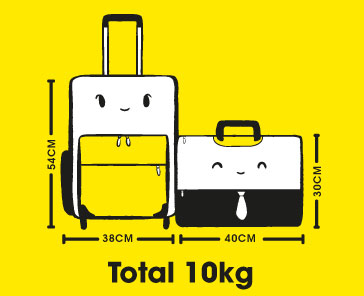
ScootPlus
Limited to 2 pieces of cabin baggage with combined weight not exceeding 15kg.
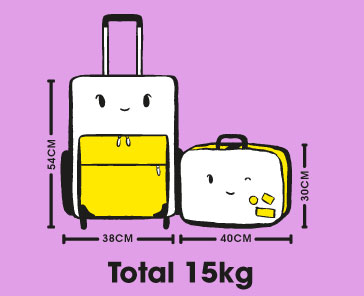
Regardless of class, you are only allowed one piece of the cabin bag which must not exceed dimensions of 54cm x 38cm x 23cm (total linear dimensions cannot exceed 115cm). This cabin bag must fit the overhead compartment in the aircraft cabin.
The other smaller cabin baggage must not exceed the dimensions of 40cm X 30cm X 10cm and must be able to fit under the seat in front of you.
There is NO cabin baggage allowance for infant.
Before you get to the airport, please ensure that your cabin baggage does not exceed the permitted allowance, or you will be advised to check in your baggage at the airport and may be subject to excess baggage fees.
Non-standard baggage
Sometimes, you may have to carry large or heavy items with you when you fly. While most sporting equipment and musical instruments can be checked in or carried on board, some restrictions apply to extremely large items or a large number of items.
If you need to transport these types of items on our flights, please contact your local cargo agent.
Sporting equipment
Your sporting equipment – such as golf clubs, surfboards, canoes, scuba diving apparel, skis and bicycles – counts towards your free baggage allowance. If you exceed this allowance, the usual additional baggage charges will apply. This policy also applies if you’re travelling to or from the USA.
We are unable to accept any item above 32kg as checked baggage, and these items may have to be re-packed or sent as cargo. Connect with your local cargo agent prior to your travel if you wish to transport any item above 32kg as cargo.
Oversized musical instruments
Oversized musical instruments - such as a cello and double bass - cannot be brought on board our flights as cabin baggage. If you’d prefer not to check your musical instrument in, you may bring one on board by purchasing an extra seat to accommodate it. We'll place the instrument on the floor and secure it to the seat frame with seat belts.
After proper packing, your musical instrument should be no larger than 140cm x 40cm x 45cm, and not exceeding 32kg.
Carriage of Luggage Powered by Lithium Batteries
Luggage powered by lithium batteries (commonly known as “Smart Luggages”) may include motors, power banks, GPS, GSM, Bluetooth, RFID or Wi-Fi technology.
All current requirements on the carriage of lithium batteries will apply to the carriage of "Smart Luggage".
In addition, the following requirements must be fulfilled for the “Smart Luggage” to be accepted as:
A. Cabin baggage:
- Lithium battery must not exceed 160 Wh.
- The luggage must be within cabin baggage allowance.
- All transmitting functions (example: GPS tracking, Bluetooth, Wi-Fi) must comply with the PED restrictions in the onboard Passenger Safety Information Card.
- Lithium battery must be removed and carried into the cabin.
- Lithium battery must not exceed 160 Wh.
- Each passenger can carry a maximum of two (2) spare lithium batteries of 100-160Wh into the cabin.
Baggage fees
Read on for a full list of baggage and booking fees or check out our FAQs if you still have more questions on baggage.
Connecting flights
If you are connecting between flights at Singapore Changi Airport, and whose connecting flights are part of a single booking itinerary, your baggage will be tagged and transferred to your connecting flight and final destination.
If you have not booked your connecting Scoot or partner flight on a single booking itinerary, your checked baggage will not be automatically transferred to your onward flight and final destination. It is your responsibility to collect your checked baggage from the arrival baggage belt, clear immigration, check in for your onward connecting flight and re-check your baggage.
Special items and prohibited goods
Sports gear, infant equipment and musical instruments may be checked in as part of your checked baggage allowance, subject to size restrictions and space availability. Refer to our Conditions of Carriage for more information.

Sprays & poisons

Toxic Substances

Lithium Batteries

Gases & Flamables

Weapons

Pets & animals
You are prohibited from carrying any dangerous good in your cabin baggage or checked baggage. Read more about it here.
Baggage Checks in the United States of America (US)
The US Transportation Security Administration (TSA) stipulates that passengers travelling into and out of US commercial airports can no longer access their checked baggage
once baggage screening is completed. Hence, we recommend that you remove all items you will need on board, before checking in your baggage.
TSA advises passengers to leave their baggage unlocked or use a TSA accepted and recognised
lock to facilitate the search process. TSA will not be liable for any damage caused to locked bags if they are opened for screening. For bags opened during screening, the screeners will close it with a tamper-evident seal and insert a notice
in your bag to inform you that the bag has been opened.
As this procedure is governed by US legislation and beyond the control of the airline, we regret that we cannot be held liable for damage or loss of items from your baggage.
You may visit the Transportation Security Administration website for further information.
If you are travelling from airports that serve as the last points of departure to US, the TSA may require passengers to undergo enhanced security
measures. Such checks may include the inspection of your Personal Electronic Devices (PEDs) and powder-like substances prior to carrying them onboard.
- Laptops
- Tablets
- E-readers
- Camera
- Portable DVD players
- Electronic game units larger than a smartphone
- Travel printers/scanners
All powder like substances with a container capacity of 12oz /350ml/350g or more are prohibited in the cabin of the aircraft and are advised to be checked-in. The following are exempted from the restrictions.
- Medically prescribed powder
- Baby Formula
- Cremated Human remains
You are strongly advised to carry any relevant supporting documentation for verification.
Baggage Checks for all flights departing from Australia
If you are departing from all Australian airports, please take note of the restrictions for the carriage of powder substances in cabin baggage.
At screening point, all powder contained in cabin baggage must be presented separately
for screening. However, there is no need to place any powder containers in a resealable plastic bag.
| Inorganic powders (restrictions apply) | Organic powders (not restricted) |
|---|---|
| Salt Salt scrub Sand Some talcum powders Some powdered deodorant Certain foot powders Powdered detergent and cleaning products | Powdered baby formula Powdered food Coffee Protein powder Flour, spices, sugar Most cosmetics Epsom salt |
Inorganic powders must be contained in containers of 350 millilitres (volume), 350 grams (weight) or less. Restriction is based on the total container volume. There are no limit on the number of containers of inorganic powders per person, provided
the total volume of all the containers of inorganic powder is 350 millilitres or less.
Please refer here to learn more about the regulations.
Lithium Batteries
How your lithium batteries are stored and their watt-hour (Wh) ratings determines whether or not they may travel by air. Use the following guide to help you find out if your batteries are accepted on Scoot flights:
| Lithium ion / Metal battery* | Allowed in cabin baggage | Allowed in checked-in baggage |
|---|---|---|
| Less than 100Wh For example: Laptops, mobile phones, and digital and video cameras | In Equipment: Yes Spare: Yes 1. Maximum of 20 pieces per passenger 2. Must be protected from damage and short circuit | In Equipment: Yes Spare: No |
| 100 to 160Wh For example: Video equipment and portable medical devices | In Equipment: Yes Spare: Yes 1. Maximum of 2 pieces per passenger 2. Must be protected from damage and short circuit | In Equipment: Yes Spare: No |
| More than 160Wh For example: Underwater lamps | In Equipment: No Spare: No | In Equipment: No Spare: No |
| Personal Transportation Devices For example: Skate scooters, segways, hoverboards, etc which are battery powered | Strictly Forbidden | Strictly Forbidden |
*Watt hours (Wh) = Amp hours (Ah) x Voltage (V)
All batteries & battery-powered devices carried must be for personal use (not for resale or distribution by a vendor)
Additional Requirements
Rechargeable battery packs, e.g. power banks, are treated as spare lithium batteries. The carriage of these items is subject to local regulations.
Spare lithium batteries are not allowed in checked-in baggage. They must be carried as
cabin baggage only.
Never carry damaged or recalled batteries or equipment on aircraft.
Spare batteries should be in the original manufacturers packaging. If not, to protect it from damage or short circuit, you should
tape across the battery’s metal parts (terminals) or place each battery in its own protective case or plastic bag.
Batteries must be installed in the equipment when checked-in.
All battery-operated devices in checked
baggage must be completely switched off (not in hibernation or sleep mode). They must also be packaged to prevent inadvertent activation and protected from damage.
Baggage Recovery
For information on baggage recovery and claims in the unlikely event that your baggage is delayed or damaged, click here.

